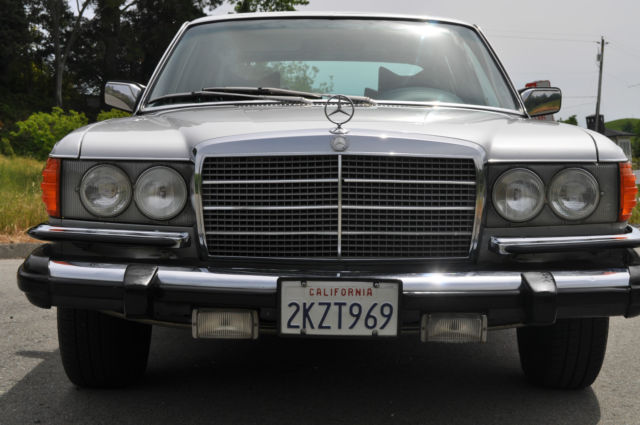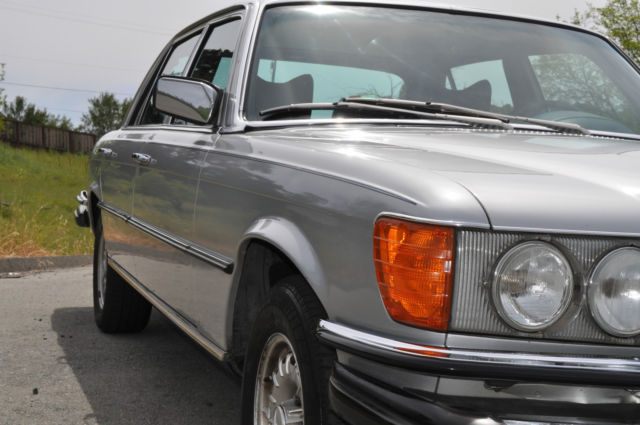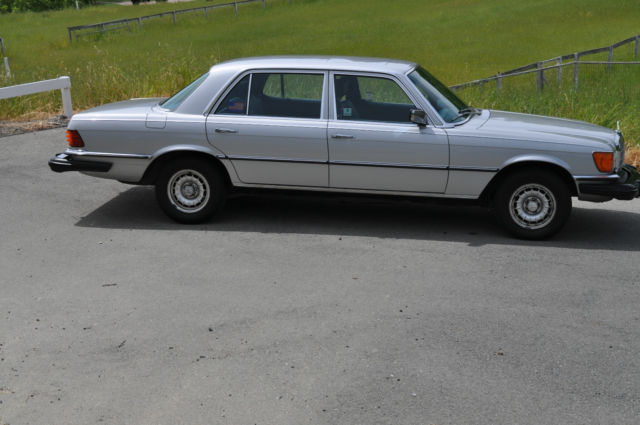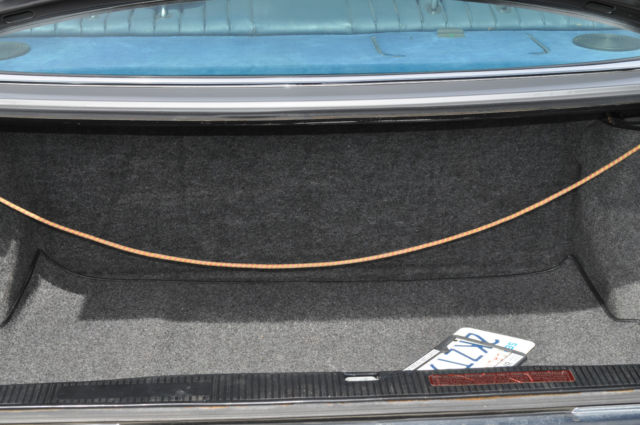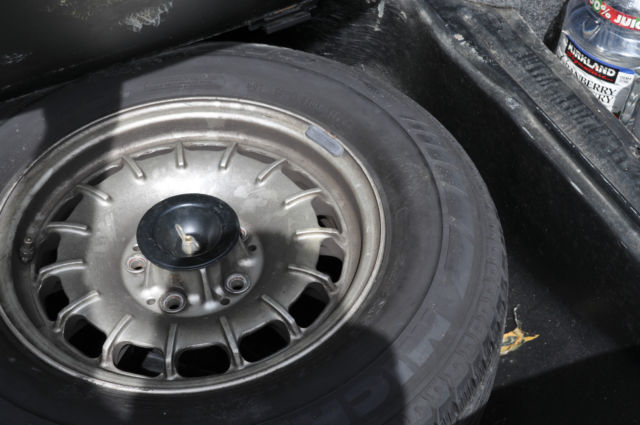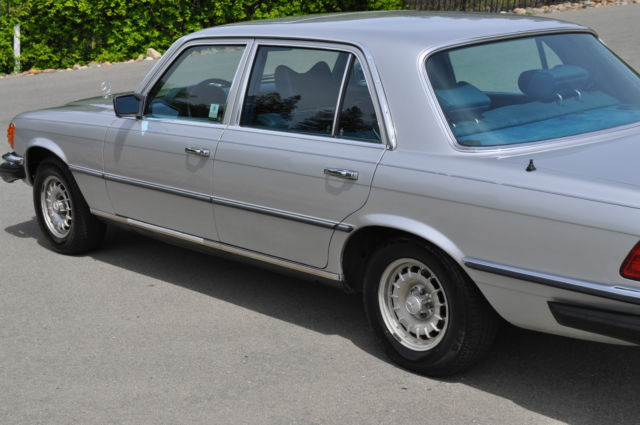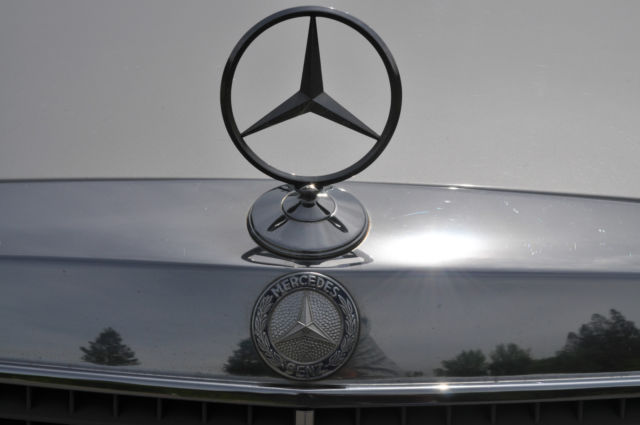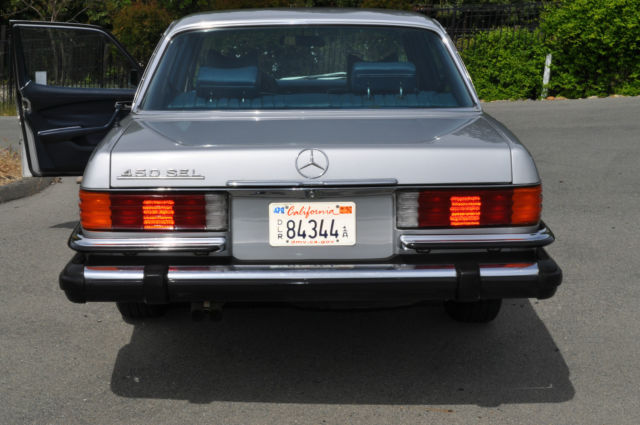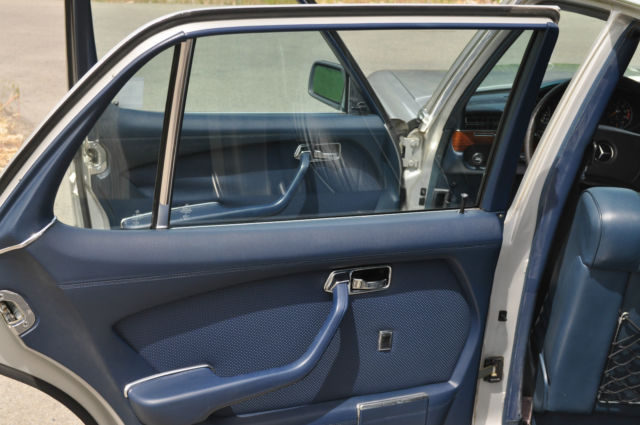1979 Mercedes-Benz 450SEL Silver V8 Automatic NO RESERVE!
- Price:
- Location: Pleasanton, California, United States
- Make: Mercedes-Benz
- Model: 400-Series
- SubModel: 450 SEL
- Type: Sedan
- Trim: --
- Year: 1979
- Mileage: 178,281
- VIN: 11603312092186
- Color: Silver
- Engine size: 8
- Number of cylinders: 8
- Power options: Air Conditioning, Cruise Control, Power Locks, Power Windows
- Fuel: Gasoline
- Transmission: Automatic
- Drive type: RWD
- Interior color: Blue
- Drive side: Left-hand drive
- Options: CD Player, Leather Seats, Sunroof
- Vehicle Title: Clear
1979 Mercedes-Benz 400-Series -- Description
NorCal Motor Cars is proud to present for sale this beautiful 1979 450SEL. This car is believed to be a two owner car that we acquired from a 92 year old man who had owned the car since the late 1980s. The car runs and drives beautifully and starts right up, even if it has been sitting for sometime. All options on the car work as they should, with the exception of the A/C which does not blow cold, the automatic antenna does not go up & down as it should, and the ashtray is missing. The only modifications done to the vehicle were the updating of the tape deck. The former owner installed a removable face plate deck in place of the original stock piece. We have the original books that came with the car, as well as the maintenance book stamped from new through 1982. I have personally driven this car regularly for the last several months as I really enjoy the way it drives.This is a great opportunity to pick up a "practical classic" that can be driven and maintained on a budget. These cars are appreciating and I have also put Hagerty's values below as well. I would classify this car as "GOOD+". Please see below on some history of the W116 Chassis S-Class Mercedes, from Wikipedia. Thanks for viewing and Happy Bidding.Current Values
- #1 Concours$25,000
- Condition #1 vehicles are the best in the world. The visual image is of the best vehicle, in the right colors, driving onto the lawn at the finest concours. Perfectly clean, the vehicle has been groomed down to the tire treads. Painted and chromed surfaces are mirror-like. Dust and dirt are banned, and materials used are correct and superbly fitted. The one word description for #1 vehicles is "concours."
- #2 Excellent$17,500
- #2 vehicles could win a local or regional show. They can be former #1 vehicles that have been driven or have aged. Seasoned observers will have to look closely for flaws, but will be able to find some not seen by the general public. The paint, chrome, glass and finishes will all appear as excellent. No excessive smoke will be seen on startup, no unusual noises will emanate from the engine. The vehicle will drive as a new vehicle of its era would. The one word description for #2 vehicles is "excellent."
- #3 Good$10,600
- #3 vehicles could possess some, but not all of the issues of a #4 vehicle, but they will be balanced by other factors such as a fresh paint job or a new, correct interior where applicable. #3 vehicles drive and run well, but might have some incorrect parts. These vehicles are not used for daily transportation but are ready for a long tour without excuses, and the casual passerby will not find any visual flaws. "Good" is the one word description of a #3 vehicle.
- #4 Fair$6,100
The Mercedes-Benz W116 is a series of flagship luxury sedans produced from September 1972 until 1980. The W116 automobiles were the first Mercedes-Benz models to be officially called S-Class, although earlier sedan models had already unofficially been designated with the letter 'S' – for Sonderklasse or "special class."
History
The 'new' S-class generation development began in 1966, which was only a year after the launch of the W108/09. This was the first Mercedes saloon to feature the brand new corporate styling theme which was to be continued until 1993 when the 190 was discontinued. The design, finalized in December 1969 was a dramatic leap forward, with more masculine lines that combined to create an elegant and sporty character. The basic design concept carried through the themes originally introduced on the R107 SL-Class roadster, especially the front and rear lights. As for the SL, the W116 received the ridged lamp covers which kept dirt accumulation at bay; this was to remain a Mercedes-Benz design theme into the 21st century. The W116 was Friedrich Geiger's last design for Mercedes-Benz; his career had started with the Mercedes-Benz 500K in 1933.
The car was presented in September 1972. The model range initially included two versions of the M110 engine (Straight-six with 2746cc displacement)—the 280 S (using a Solex carburetor) and the 280 SE (using Bosch D-Jetronic injection), plus the 350 SE, powered by the M116 engine (V8 with 3499cc displacement). After the 1973 Fuel Crisis, a long-wheelbase version of the 280 was added to the lineup.
Half a year later, in early 1973, two new models powered by the M117 engine (V8 with 4520cc displacement) were added to the range—the 450 SE and the 450 SEL (with a 100mm longer body). The 450 had 225PS (165kW) in most markets, federalized cars offered 190hp (142kW) while Swedish market cars had an EGR-valve and 200PS (147kW) until 1976. The 450s received a plusher interior as well, with velour or leather seats rather than the checkered cloth of the lesser models. The door insides were also of a different design, being pulled up around the windows.
The 300 SD sedan (American market only) had a turbocharged 3.0-litre inline-five diesel engine developed from the C111 experimental vehicle. In September 2013, a 1979 W116 300 SD was campaigned in the 24 Hours of Lemans at Carolina Motorsports Park, where it completed 166 laps at an average speed of 54.8 MPH. It won the highest prize of the event, the Index of Effluency. Other than mild issues relating to brake and tire wear, no mechanical issues were encountered. After numerous modifications to handling, the car was again run in February 2014 at Barber Motorsports park in Birmingham, AL. It placed 44th, but turned 281 laps at an average pace of 59.6 MPH. One of the key advantages of the 300 SD is its exceptional fuel economy on track, where it burns just 2.5 GPH (Roughly 18MPG). In July 2014 it placed first in class at Sebring. It is still active in the series.
The 450 SE was named the European Car of the Year in 1974, even though the W116 range was first introduced at the Paris Motor Show in the fall of 1972. The W116 range became the first production car to use an electronic four-wheel multi-channel anti-lock braking system (ABS) from Bosch as an option from 1978 on.
Production totaled 473,035 units. The W116 was succeeded by the W126 S-Class in 1979. The W116 was sold throughout Europe, the Americas, Asia, the Middle East, Africa, and Australia.
Models The entry level six cylinder 280 S was the only model in the range to incorporate a carburetor.In 1975, the W116 was upgraded with a new fuel injection system to comply with revised exhaust emission standards in European markets. A slight power reduction was a result of this update. In 1978, a series of engine upgrades restored original performance levels with new fuel injection systems.
| W116.020 | 1973–1980 | 280 S sedan | 2.8 L M110 I6 | 122,848 | |||||||||||||||||||||||||||||||||||||||||||||||||||||||||||||||||||||||||||||||||||||||||||||||||||||||||||||||||||||||||||
| W116.024 | 1973–1980 | 280 SE sedan | 2.8 L M110 I6 | 150,593 | |||||||||||||||||||||||||||||||||||||||||||||||||||||||||||||||||||||||||||||||||||||||||||||||||||||||||||||||||||||||||||
| W116.025 | 1974–1980 | 280 SEL sedan | 2.8 L M110 I6 | 7,032 | |||||||||||||||||||||||||||||||||||||||||||||||||||||||||||||||||||||||||||||||||||||||||||||||||||||||||||||||||||||||||||
| W116.028 | 1973–1980 | 350 SE sedan | 3.5 L M116 V8 | 51,100 | |||||||||||||||||||||||||||||||||||||||||||||||||||||||||||||||||||||||||||||||||||||||||||||||||||||||||||||||||||||||||||
| W116.029 | 1973–1980 | 350 SEL sedan | 3.5 L M116 V8 | 4,266 | |||||||||||||||||||||||||||||||||||||||||||||||||||||||||||||||||||||||||||||||||||||||||||||||||||||||||||||||||||||||||||
| W116.032 | 1973–1980 | 450 SE sedan | 4.5 L M117 V8 | 41,604 | |||||||||||||||||||||||||||||||||||||||||||||||||||||||||||||||||||||||||||||||||||||||||||||||||||||||||||||||||||||||||||
| W116.033 | 1973–1980 | 450 SEL sedan | 4.5 L M117 V8 | 59,578 | |||||||||||||||||||||||||||||||||||||||||||||||||||||||||||||||||||||||||||||||||||||||||||||||||||||||||||||||||||||||||||
| W116.036 | 1975–1980 | 450 SEL 6.9 | 6.9 L M100 V8 | 7,380 | |||||||||||||||||||||||||||||||||||||||||||||||||||||||||||||||||||||||||||||||||||||||||||||||||||||||||||||||||||||||||||
| W116.120 | 1978–1980 | 300 SD sedan | 3.0 L OM617 I5 turbodiesel (United States and Canada only) | 28,634 Technical data Technical data Mercedes-Benz W116 (Manufacturer's figures except where stated)
Features Mercedes-Benz 280 SE (France) Mercedes-Benz 450 SEL (Australia) The W116 S-Class incorporated a broad variety of Mercedes-Benz safety innovations.
|
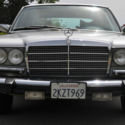 1979 Mercedes-Benz 450SEL Silver V8 Automatic
1979 Mercedes-Benz 450SEL Silver V8 Automatic
Mileage: 178,281
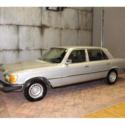 1979 Mercedes-Benz 450SEL 50395 Miles Silver 8 Automatic
1979 Mercedes-Benz 450SEL 50395 Miles Silver 8 Automatic
Mileage: 50,395
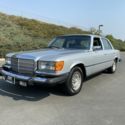 1979 Mercedes Benz 450SEL 53716 Miles Silver Sedan Automatic
1979 Mercedes Benz 450SEL 53716 Miles Silver Sedan Automatic
Mileage: 53716
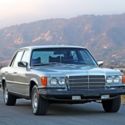 1979 Mercedes-Benz 450SEL 6.9: 48K Original Miles, Silver/Blue, Gorgeous Example
1979 Mercedes-Benz 450SEL 6.9: 48K Original Miles, Silver/Blue, Gorgeous Example
Mileage: 48,700
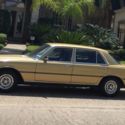 1979 Mercedes-Benz 450SEL 100,727 Miles Gold V8 Automatic
1979 Mercedes-Benz 450SEL 100,727 Miles Gold V8 Automatic
Mileage: 100,727
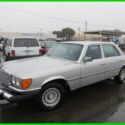 1980 Mercedes-Benz 450SEL 4-Door Sedan 8-cylinder Automatic NO RESERVE
1980 Mercedes-Benz 450SEL 4-Door Sedan 8-cylinder Automatic NO RESERVE
Mileage: 70,656
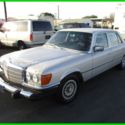 B 1975 Mercedes-Benz 450SEL 4-Door Sedan 8-Cylinder Automatic Gas NO RESERVE
B 1975 Mercedes-Benz 450SEL 4-Door Sedan 8-Cylinder Automatic Gas NO RESERVE
Mileage: 115,413
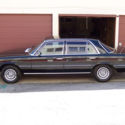 Mercedes-Benz 450sel 1979
Mercedes-Benz 450sel 1979
Mileage: 173,820
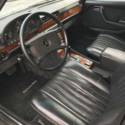 1979 Mercedes-Benz Other 450SEL
1979 Mercedes-Benz Other 450SEL
Mileage: 10000
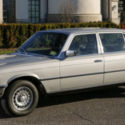 1979 mercedes-benz 450sel
1979 mercedes-benz 450sel
Mileage: 49,352
